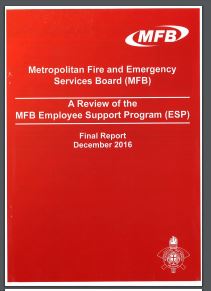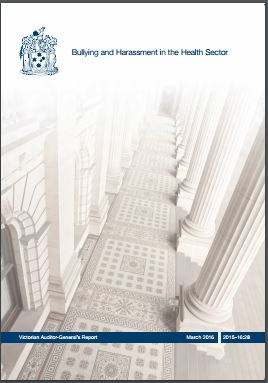The BP Deepwater Horizon disaster has faded to become another safety leadership failure to be discussed in the OHS and risk management courses but some new research ($ paywall) in Critical Perspectives on Accounting provides a fresh perspective on BP’s safety culture and leadership prior to the major disaster by deconstructing the speeches of the the then-CEO, Tony Hayward.
Category: safety culture
Firefighting mental health report leaked
 The Herald-Sun newspaper has released the final report into the mental health and suicide rate of Victorian metropolitan firefighters.
The Herald-Sun newspaper has released the final report into the mental health and suicide rate of Victorian metropolitan firefighters.
The report, authored by Dr Peter Cotton, found that the issues uncovered in the review of firefighters in the Metropolitan Fire Brigade (MFB) are not dissimilar from the findings of other inquiries into emergency service organisations like the police or the ambulance service.
What can we learn about Change from hearing loss in a Korean factory?
 I have purchased Kevin Burns’ book “PeopleWork” after receiving an email promotion but before I did I followed the link to his website and watched an embedded video where Kevin says:
I have purchased Kevin Burns’ book “PeopleWork” after receiving an email promotion but before I did I followed the link to his website and watched an embedded video where Kevin says:
“At no time in history have there been better processes and procedures in workplace safety and at no time in history have there been more certified safety professionals but at the same time the number of workplace incidents keep rising across the board.”
Any salesman is allowed some hyperbole but the last point does not stack up and is a bit confusing. For instance workplace fatalities have been declining in Australia for some decades but new work-related hazards are being acknowledged and existing hazards that were once dismissed are now being addressed. The number of certified occupational health and safety (OHS) professionals is irrelevant as the laws have existed for much longer and it is the laws with which employers must comply, not the advice of the OHS professional.
But Kevin Burns talks specifically about the number of workplace incidents and this is almost impossible to quantify.
Just after I purchased Kevin’s book I received a research paper entitled “
Firefighters’ mental health
More details are appearing of the findings of an independent inquiry into mental health and suicides in the Melbourne Metropolitan Fire Brigade (MFB), a report whose release has been stalled by the United Firefighters’ Union (UFU).
 According to the inquiry’s chair, in an article in the ABC news website, Dr Peter Cotton,
According to the inquiry’s chair, in an article in the ABC news website, Dr Peter Cotton,
“…the MFB has a mono-culture with few women or members from diverse backgrounds, making it difficult to assess the level of bullying and harassment.”
“… the MFB does not screen for alcohol or drug use, and has a lack of policies and procedures to address drug and alcohol issues.”
“Management’s handling of complaints were found to be ad hoc and inconsistent with a “lack of will to follow up” and “give them a wide berth” thought pattern.”
“the mental health of firefighters was comparable with Victoria Police and Ambulance Victoria,…”
The latter point is useful to remember as a similar report into the Victoria Police was released earlier this year. The most recent inquiry into Ambulance Victoria was undertaken by the Victorian Auditor-General in 2016. Continue reading “Firefighters’ mental health”
Cabbage Salad and Drugs
Episode 6 of the Cabbage Salad and Safety podcast is now available with the discussion centring on drugs and alcohol issues at work. For those looking for information on drug and alcohol testing, this episode is not for you. We thought that the testing issue is dealt with in many workplaces through legislative and regulatory matters and you have to comply with what you have to comply. Continue reading “Cabbage Salad and Drugs”
Gender, violence, Batty, Hulls and business preparedness
Recently the Victorian Women Lawyers conducted a seminar into the outcomes of Victoria’s Royal Commission into Family Violence. SafetyAtWorkBlog attended even though the topic seems, initially, to have a tenuous link to occupational health and safety (OHS). Family violence is relevant to OHS through its influence on workplace mental ill-health, productivity and the need for cultural…
Not all deaths are “newsworthy” but they are all important
As Australia’s Safe Work Month closes, the media is focussed on the four fatalities at Dreamworld theme park in Queensland. That situation is complicated as, although the incident is being investigated partly under Work Health and Safety laws, the decedents were visitors to the workplace. On the other side of the continent in Perth, prior…


